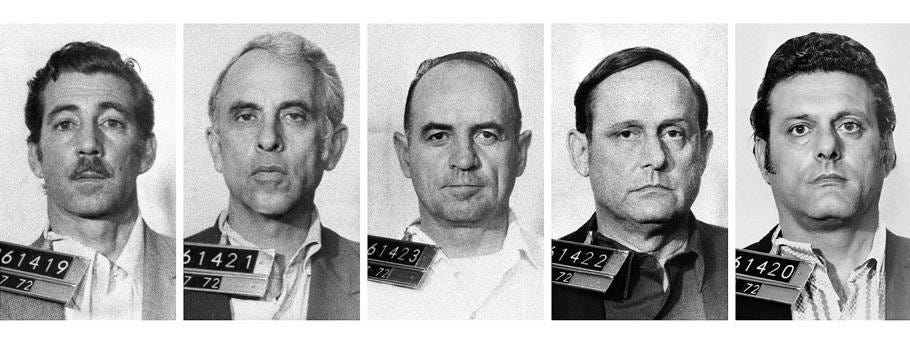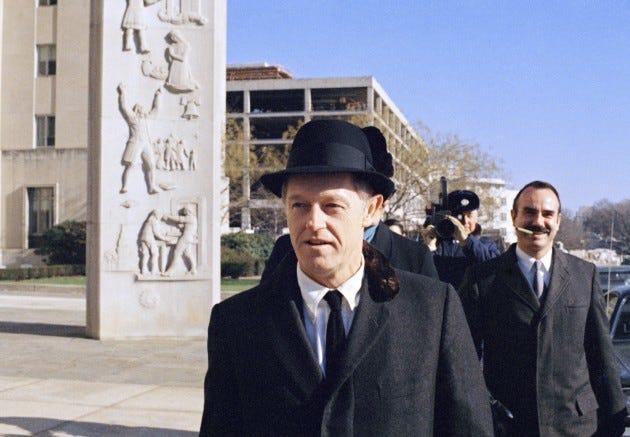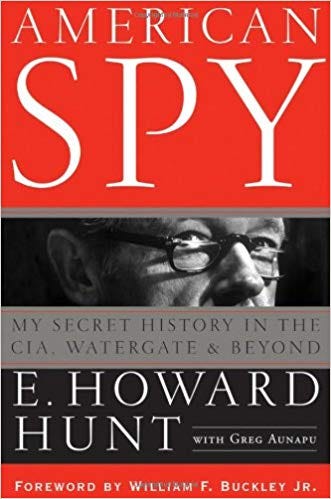This month marks the 50th anniversary (June 17) of the break-in at Democratic National Headquarters in the Watergate Complex. A whole generation – including many a young journalism student like myself – witnessed first hand how government could engage in espionage and disinformation campaigns against its own citizens in the name of partisan victory.
The lying began on June 19, when the Washington Post asked several Nixon Administration officials about Watergate burglar James McCord, who appeared to be former CIA officer and current security coordinator for President Nixon's reelection committee.
John Mitchell, who resigned as Nixon’s attorney general to head that committee, told the Post that the burglars “were not operating either in our behalf or with our consent” in the alleged bugging attempt.
The denials continued into September, when the Post reported Mitchell controlled a secret Republican fund used to bankroll intelligence operations against the Democrats.
“There is absolutely no truth to the charges in the Post story,” the campaign insisted. “Neither Mr. Mitchell nor Mr. Stans has any knowledge of any disbursement from an alleged fund.”
Now, he didn’t use the phrase “fake news,” but Nixon campaign chairman Clark MacGregor accused the Post of using “innuendo, third-person hearsay, unsubstantiated charges, anonymous sources and huge scare headlines” in its partisan conspiracy against an innocent president.
“The Post has maliciously sought to give the appearance of a direct connection between the White House and the Watergate, a charge which the Post knows and half a dozen investigations have found to be false,” McGregor said one month prior to Nixon’s landslide reelection. “The hallmark of the Post’s campaign is hypocrisy."
In 1975, six months after Nixon resigned, Mitchell was convicted of conspiracy, obstruction of justice and perjury. He spent 19 months in prison. All told, some 48 people – many of them top Nixon administration officials – were convicted.
The Watergate conspiracy theory was actually a conspiracy. Any notion that you could take government assertions at face value would disappear for decades.
Watergate operative Howard Hunt leads G. Gordon Liddy in procession to court
What the burglars saw
CIA surveillance tech McCord and the other four intruders – Bernard Barker, Virgilio Gonzalez, Eugenio Martínez and Frank Sturgis – were charged with conspiracy, burglary and violating federal wiretapping laws.
Their handlers, White House operatives G. Gordon Liddy and Howard Hunt, went to jail as well. Whether their little Bay of Pigs crew reunion was out to find evidence that Fidel Castro was funding Democratic political campaigns or Nixon was worried that DNC Chair Larry O’Brien had compromising intel on him, the burglary was an early salvo in what has become brutal politics as usual.
“Watergate set off a blood feud between Democrats and Republicans that may continue for generations,” wrote Howard Hunt in his memoir, An American Spy, published just after his death in 2007. “Since then, each party resurrects the fight with every transgression by the other party … Americans now suffer from political fatigue, lacking faith in the leadership of both parties.”
The blood feud continued through Ronald Reagan’s Iran-Contra scandal, the impeachment hearings of Presidents Clinton and Trump, and culminated in the Jan. 6 riot at the Capitol after Trump claimed the 2020 election had been stolen and refused to concede.
Recent polls indicate the vast majority of Republicans believe the 2020 election was fraudulent and the Jan. 6 riot was a false-flag operation by members of Antifa and Black Lives Matter to make Trump supporters look bad.
MORE: America has yet to decide what happened on Jan. 6, 2021
“About seven-in-ten Americans (71 percent) say that the federal government intentionally withholds important information from the public,” says a recent Pew Research study on public distrust of government.
Pew has been studying trust in government since 1958, when about three-quarters of Americans said they trusted the federal government to do the right thing almost always or most of the time. Public trust reached a three-decade high shortly after 9/11, but declined quickly thereafter. Since 2007, the segment of government-trusters of either party has not surpassed 30 percent.
That whole Bay of Pigs thing
About a week after the June 17 Watergate break-in, top Nixon aides Bob Haldeman and John Ehrlichman met with CIA director Richard Helms. Helms was a deputy director of CIA covert operations during the Bay of Pigs, a plan to overthrow Fidel Castro supported by Vice-president Richard Nixon in 1960.
Haldeman delivered a message from Nixon to Helms on that fateful June day in 1972 – the CIA needed to tell the FBI to stop investigating the Watergate money trail to Mexico or “the Bay of Pigs may be blown.”
“Richard Helms yelled like a scalded cat,” Ehrlichman wrote in Witness to Power (1978). “‘We’re not afraid of that!’ he said with more animation than I’d ever seen in that urbane gentleman before.”
“The whole Bay of Pigs thing” as a euphemism for the Kennedy assassination was brought to mass attention in Oliver Stone’s 1995 film, “Nixon.” Jeff Morley, author of the forthcoming Scorpions’ Dance, will explore the connections on the 50th anniversary of the Watergate break-in.
“New evidence proves that Haldeman was right,” writes Morley, a former Washington Post reporter who’s been covering the JFK assassination since 1995. “I’ll present the proof and explain how the murder of 35th president figured in the downfall of the 37th president.”
Click here for more information on Morley’s online presentation for D.C.’s Spy Museum – and here to learn more about Scorpion’s Dance.
Center for Conspiracy Studies on Twitter
Twitter seems as good a place as any to share the latest in conspiracy news. If you’re on Twitter, follow our posts at @TruthsmackSaint!










